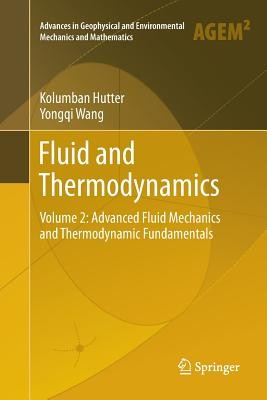
- We will send in 10–14 business days.
- Author: Kolumban Hutter
- Publisher: Springer
- ISBN-10: 3319815628
- ISBN-13: 9783319815626
- Format: 15.6 x 23.4 x 3.4 cm, minkšti viršeliai
- Language: English
- SAVE -10% with code: EXTRA
Reviews
Description
In this book fluid mechanics and thermodynamics (F&T) are approached as interwoven, not disjoint fields. The book starts by analyzing the creeping motion around spheres at rest: Stokes flows, the Oseen correction and the Lagerstrom-Kaplun expansion theories are presented, as is the homotopy analysis. 3D creeping flows and rapid granular avalanches are treated in the context of the shallow flow approximation, and it is demonstrated that uniqueness and stability deliver a natural transition to turbulence modeling at the zero, first order closure level. The difference-quotient turbulence model (DQTM) closure scheme reveals the importance of the turbulent closure schemes' non-locality effects. Thermodynamics is presented in the form of the first and second laws, and irreversibility is expressed in terms of an entropy balance. Explicit expressions for constitutive postulates are in conformity with the dissipation inequality. Gas dynamics offer a first application of combined F&T. The book is rounded out by a chapter on dimensional analysis, similitude, and physical experiments.
EXTRA 10 % discount with code: EXTRA
The promotion ends in 23d.16:13:12
The discount code is valid when purchasing from 10 €. Discounts do not stack.
- Author: Kolumban Hutter
- Publisher: Springer
- ISBN-10: 3319815628
- ISBN-13: 9783319815626
- Format: 15.6 x 23.4 x 3.4 cm, minkšti viršeliai
- Language: English English
In this book fluid mechanics and thermodynamics (F&T) are approached as interwoven, not disjoint fields. The book starts by analyzing the creeping motion around spheres at rest: Stokes flows, the Oseen correction and the Lagerstrom-Kaplun expansion theories are presented, as is the homotopy analysis. 3D creeping flows and rapid granular avalanches are treated in the context of the shallow flow approximation, and it is demonstrated that uniqueness and stability deliver a natural transition to turbulence modeling at the zero, first order closure level. The difference-quotient turbulence model (DQTM) closure scheme reveals the importance of the turbulent closure schemes' non-locality effects. Thermodynamics is presented in the form of the first and second laws, and irreversibility is expressed in terms of an entropy balance. Explicit expressions for constitutive postulates are in conformity with the dissipation inequality. Gas dynamics offer a first application of combined F&T. The book is rounded out by a chapter on dimensional analysis, similitude, and physical experiments.


Reviews